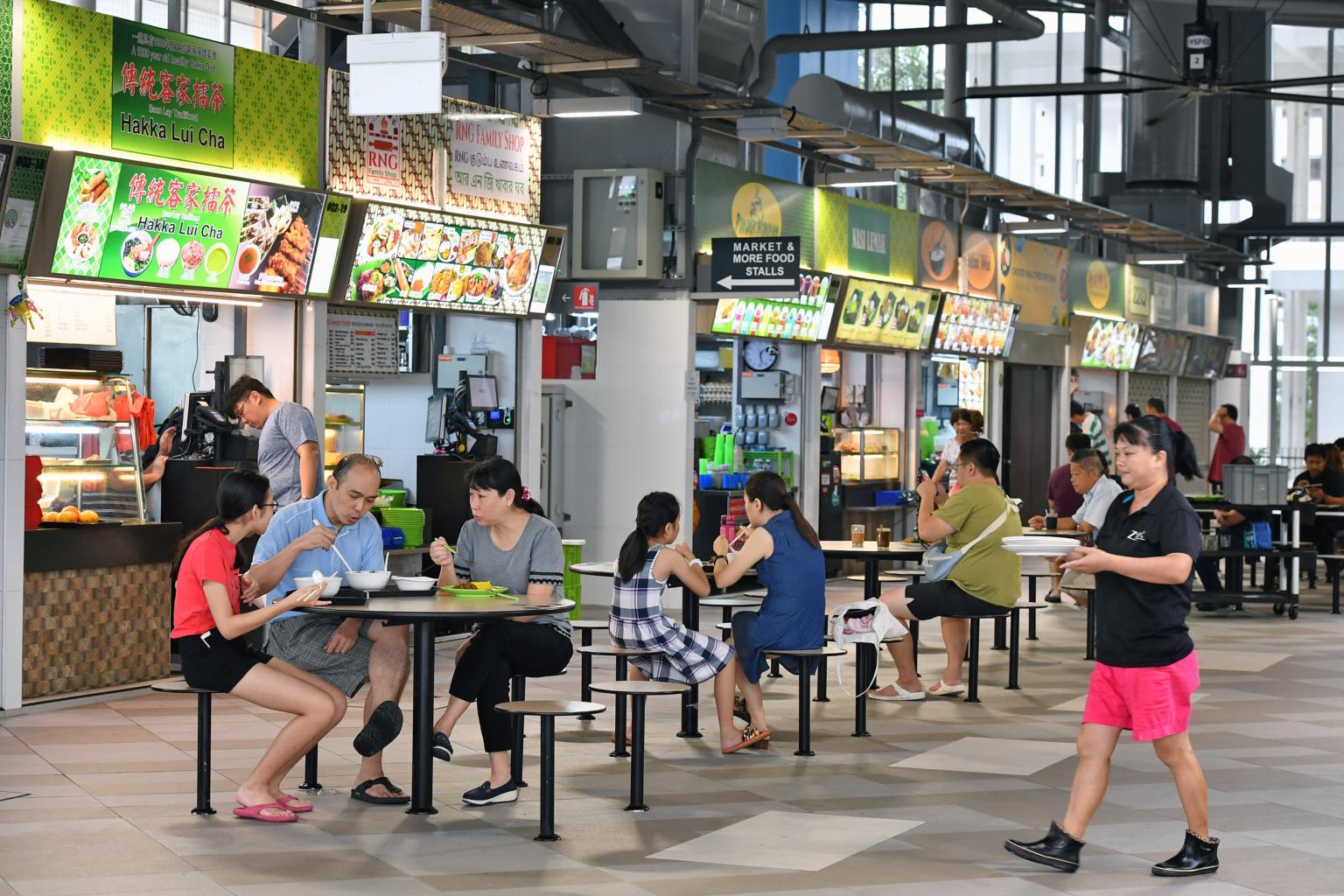NEA to do 'stocktake' of not-for-profit hawker centre model, errant operators will be taken to task: Amy Khor
Sign up now: Get ST's newsletters delivered to your inbox

People having meals at Jurong West Hawker Centre on Oct 13, 2018. A dispute about trays at the hawker centre was resolved recently after an August petition by hawkers.
ST PHOTO: CHONG JUN LIANG
SINGAPORE - The National Environment Agency (NEA) will do a "stocktake" of the not-for-profit hawker centre model which allows social enterprises and cooperatives to run these centres, said Senior Minister of State for the Environment and Water Resources Amy Khor.
The NEA has also been asked to quickly iron out problems relating to cost and contractual terms used by these operators, she said in a Facebook post on Friday (Oct 19).
Dr Khor revealed that the NEA is already reviewing the contractual agreements with a view to prescribing some of the terms used by operators in these contracts.
Her comments came in the wake of complaints from hawkers about high rents and being saddled with additional fees for services such as tray returns. "We hear the concerns raised... NEA will not hesitate to take operators to task if they are found to be errant," said Dr Khor, who is also Senior Minister of State for Health.
Not-for-profit hawker centres came under the spotlight in late August, when food critic and Makansutra founder K. F. Seetoh claimed that they were being run like "a hard-core commercial Food Court management system" - highlighting how hawkers had to pay for services such as coin-changing services and for spot checks to ensure the quality of food, pushing up total rents.
Tenants at Jurong West Hawker Centre also submitted a petition in August to its operator, Hawker Management - a subsidiary of food centre operator Koufu - complaining about a scheme in which they had to pay customers 20 cents each time a tray was returned.
It was resolved on Thursday after the operator agreed to change the system to one where customers pay a 20-cent deposit to collect clean trays for use, and are refunded the same amount when they return the trays at designated collection points.
In her post, Dr Khor said the not-for-profit model was intended to address challenges faced by the hawker trade, such as renewal and manpower constraints, and at the same time meet the evolving dining needs of residents.
"Some flexibility is given to these enterprises to try out different ideas and innovative practices, to bring about vibrancy in our hawker centre scene, and benefit both patrons and hawkers," she said.
At the same time, the authorities set controls on food prices. Operators whose bids offer the lowest total cost to stallholders were assessed more favourably, and rentals cannot be raised during the tenancy period.
"This is to ensure that Singaporeans continue to have access to affordable food in clean environments, and that our hawkers can earn a decent living," she added.
The idea was first recommended by the 18-member Hawker Centres Public Consultation Panel, which was formed in 2011 and chaired by entrepreneur Elim Chew.
In 2015, NEA began appointing socially conscious operators to manage new hawker centres.
Currently, seven out of 114 hawker centres are new centres managed by private social enterprises and cooperatives, such as Hawker Management by Koufu, Fei Siong Social Enterprise, NTUC Foodfare, Timbre+Hawkers, and OTMH by Kopitiam.
Dr Khor said this management model was piloted about three years ago, with the last two hawker centres under it opening only this year.
"We have been monitoring and evaluating the model with the view to further refine and improve it," she said.
The passionate views shared by many on this issue show the important place hawker culture has in the hearts of Singaporeans, she added.
"Such conversations are important, and we welcome the feedback so that we can continue to do better."
Describing the stocktake as a "good step forward", Mr Seetoh said he hoped it would involve taking a closer look at the contracts issued by the socially conscious operators, to check if these contracts are in line with encouraging a social enterprise culture and developing new hawkers.
"Right now, I believe there are several different contracts, and things are quite haphazard," he said.
"Having an incubation stall programme is good, but how can we improve on it to develop hawkers for the future? We can profile the success stories, but we should also speak to those who failed, and learn from their lessons."
"I think the Government - and Dr Amy Khor's - intention is 100 per cent spot on, in that we have to address the viability and sustainability of hawker culture. But I hope the authorities will work more closely with the community in this regard. Hawker centres are built for - and powered by - the people, so I am sure there are many people out there with good ideas about how to manage and encourage a new generation of hawkers," he added.
Additional reporting by Benson Ang


